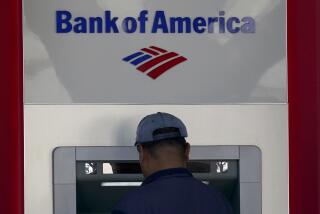NYSE Fines Kidder on Charges It Misused Customer Securities
- Share via
NEW YORK — Kidder, Peabody & Co., one of the investment firms in the middle of the Wall Street insider trading scandal, has agreed to pay a $300,000 fine to the New York Stock Exchange to settle charges that include the repeated misuse of customer securities, the exchange disclosed Monday.
One former and one current Kidder executive also both agreed to pay fines of $25,000 each, the exchange said.
The Big Board and the firm noted in separate statements Monday that the latest disciplinary action is not related to charges brought Feb. 12-13 by federal prosecutors that three Kidder executives had participated in a broad scheme to illegally trade inside information about pending corporate merger deals.
But the NYSE action covers a long string of recurring problems with Kidder’s handling of customer securities that the exchange clearly found disturbing.
The $300,000 settlement, an NYSE official said, is among the largest penalties ever imposed by the exchange on a member firm for alleged violations of exchange rules.
In the past seven years, the exchange said, only one firm--Bache Halsey Stuart Shields, since acquired by Prudential Insurance--has paid a higher penalty, a $400,000 settlement in 1982. At least two other firms have paid $300,000.
As a self-regulatory organization, the NYSE is empowered by the Securities and Exchange Commission to take a wide range of disciplinary action against its member brokerage firms.
In most cases, including Monday’s action against Kidder, the penalties are subject to review by the SEC.
Also cited by the NYSE were John T. Roche, Kidder’s executive vice president, who was fined $25,000 and censured for failing to reasonably discharge his supervisory duties, and Gerard A. Miller, former director of operations, who was fined $25,000, censured and barred for six months from any job involving the supervision of securities accounts.
Miller is no longer employed at Kidder.
One NYSE source said regarding Kidder: “It’s clear that, given the repetitive nature of the violations, we were impelled to seek a bigger fine than we would have otherwise.”
In a statement distributed Monday to its own employees and to the press, Kidder dismissed the violations as relating to “highly technical and complex aspects of the control of customer securities and related accounting and reporting procedures.”
Kidder said it agreed to settle the NYSE charges without admitting or denying them to avoid the expense of fighting the matter in court, and added that “at no time was any customer at risk of losing any money” because of the practices in question.
Kidder also said it had been developing new systems to oversee the accounting and movement of customer securities. One exchange executive involved in the case said the level of violations at Kidder has sharply dropped off. “We haven’t seen comparable problems in the last year or so, so maybe the system has finally taken.”
The NYSE’s charges are more extensive than similar charges brought in 1985 against Kidder, historically one of the nation’s most prestigious brokerage houses, by the SEC. The firm settled those charges largely by agreeing to improve its bookkeeping.
The SEC’s complaint covered the period from October, 1983, to October, 1984. The Big Board, however, cited record-keeping problems it unearthed in accounts as far back as 1982 and as recently as last year.
The exchange said audits of Kidder customer accounts from 1982 through 1986 showed consistent violations of rules requiring the firm to segregate customer securities from its own.
In some cases the firm used customer securities to cover its own short sales--that is, cases in which the firm had already sold stocks or bonds it did not already own. The NYSE also charged Kidder with a wide variety of bookkeeping and other violations.
Although the exchange did not say how extensive the practice was, the SEC last year said Kidder had used as much as $145 million in customer securities as collateral for its own bank loans and other financings during the year covered by its complaint.
More to Read
Inside the business of entertainment
The Wide Shot brings you news, analysis and insights on everything from streaming wars to production — and what it all means for the future.
You may occasionally receive promotional content from the Los Angeles Times.










